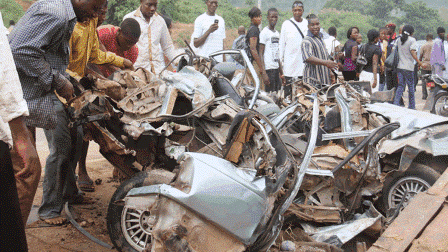…Says At Least 100 People Dies On Nigerian Roads Daily
ROTIMI ASHER
About 90 % of road traffic deaths and injuries occur in low income and middle income countries, which have only 48% of the world registered vehicles. A safety expert, Patrick Adenusi, made this known while presenting a paper on ‘’Road User Attitude- Cost and Effect’’ during the 2019 Nigerian Auto Journalists training workshop held in Lagos recently.
[dropcap]A[/dropcap]ccording to Adenusi, volume of vehicles in the high income countries are more than what there are in low income nations, where, ironically, more deaths are recorded.
He explained:“The total number of vehicles in Houston alone is higher than the numbers in Nigeria, but we record more deaths in Nigeria, because of attitudes. The same law, the same number of brain cells yet more accidents. I have been to several places in the world, but the degree of lawlessness in Nigeria is unrivalled.
 Adenusi berates attitude of many Nigerians, which he believes do not make things to work in favour of Nigeria.
Adenusi berates attitude of many Nigerians, which he believes do not make things to work in favour of Nigeria.
“Motorization is increasing,” he said, “but unfortunately the increase comes with fatality. Vehicles were not designed to kill, but to provide comfort. It is the way we use it that lead to fatality, and it is expensive.
“Every year, before 2011, 3,500 are killed daily, 1.3 million yearly. That is the global statistic. The World Health Organization (WHO) says at least 100 people are killed on Nigeria roads daily. Road transportation accounts for over 90% of transportation in Nigeria. Rail has collapsed though there is hope of resurgence through Lagos State rail programme.
‘’ There is so much concentration on road at the expense of other means of transportation. If the rail wakes up the pressure on the roads may be reduced from 90%. Air would have been cheaper and faster mode for people to transport within Nigeria, but unfortunately, they make it look high class. Even mechanics who can afford to fly by air is not thinking about it, because they never told him he can. The aviationsector is not getting the required patronage they need to have.

He blamed wrong road usage to a number of factors, including unskilled drivers, poor engineered roads, poorly maintained roads, poor enforcement, road rage, abuse of siren.
‘’As a result of lawlessness and indiscipline on our roads,” Adenusi stated, “a lot of money is being wasted. If 500,000 vehicles are trapped in traffic daily on Lagos roads and each vehicle expends N500 extra fuel above their daily consumption, they would have wasted N250,000,000 daily, Monday through Friday would cost N1.25 billion, in a month N5 billion. At the end of the year, N60 billion has gone down the drain in Lagos alone.
Adenusi, who lamented over what he described as failure of the nation’s government functionaries to do the needful, urged members of the Nigerian Auto Journalists Association (NAJA) to be the voice of advocacy and action, as he called on government and political associates to recognize the economic, emotional, social and medical cost of trauma and crashes and assume leadership role in their prevention.”



